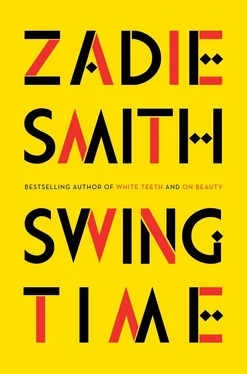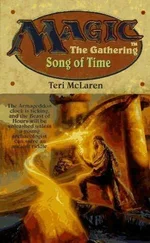He turned round and spotted me. Something in his face told me I was being pitied, and I was moved when, with effortful kindness, he began a game of hide and seek around the concrete pillars. Every time his shaggy blond head popped out from behind a block I had that out-of-body sensation: here is my father’s son, looking just like my father’s son, isn’t that interesting? As we played we heard raised voices from upstairs. I tried to ignore them, but my new playmate stopped running and stood under the balcony and listened. At a certain point the anger flashed back into his eyes and he said to me: “Let me tell you something: he don’t care about no one. He’s not what he seems. He’s fucked up in the head. Marrying that bloody spade!”
And then the girl came running down the stairs. No one ran after her, not my father or my mother. She was still crying and she came to the boy and they hugged and, still hugging, walked across the grass and out of the estate. Snow was lightly falling. I watched them go. I didn’t see them again until my father died and they were never spoken of during my childhood. For a long time I thought the whole thing was a hallucination, or perhaps something I’d lifted from a bad film. When Tracey asked me about it I told her the truth, although with some elaboration: I claimed that a building we walked past daily, on Willesden Lane, the one with the shabby blue awning, was the Royal Ballet School, and that my cruel white posh sister went there, and was very successful but refused even to wave to me from the window, can you believe it? As she listened I witnessed a great struggle in her face to believe it, mostly expressed by her nostrils. Of course Tracey very likely had been inside that building herself, and would have known perfectly well what it really was: a down-at-heel event space where a lot of cheap local weddings were held, and sometimes the bingo. A few weeks later, as I was sitting in the back of my mother’s ridiculous car — a tiny, white, ostentatiously French 2CV with a CND sticker placed next to the tax disk — I spotted a hard-faced bride, half swallowed by tulle and ringlets, standing outside my Royal Ballet, smoking a fag, but I did not let this vision penetrate my fantasy. By then I had come to share my friend’s insusceptibility to reality. And now — as if we were both trying to get on a see-saw at the same time — neither of us pressed too hard and a delicate equilibrium was allowed to persist. I could have my evil ballerina if she could have her backing dancer. Maybe I never got out of this habit of elaboration. Twenty years later over a difficult lunch I revisited the story of my ghostly siblings with my mother, who sighed, lit a cigarette and said: “Trust you to add snow.”
Ten
Long before it became her career my mother had a political mind: it was in her nature to think of people collectively. Even as a child I noticed it, and felt instinctively that there was something chilly and unfeeling in her ability to analyze so precisely the people she lived among: her friends, her community, her own family. We were all, at one and the same time, people she knew and loved but also objects of study, living embodiments of all she seemed to be learning up at Middlesex Poly. She held herself apart, always. She never submitted, for example, to the neighborhood cult of “sharpness”—the passion for shiny shell-suits and sparkling fake gems, for whole days spent in the hair salon, children in fifty-quid trainers, settees paid for over several years on hire purchase — although neither would she ever entirely condemn it. People are not poor because they’ve made bad choices, my mother liked to say, they make bad choices because they’re poor. But though she was serene and anthropological about these matters in her college essays — or while lecturing me and my father across the dinner table — I knew in her real life she was often exasperated. She didn’t pick me up from school any more — my father did that now — because the scene there aggravated her too much, in particular the way, each afternoon, time collapsed, and all those mothers became kids again, kids who had come to collect their kids, and all of these kids together turned from school with relief, free finally to speak with each other in their own way, and to laugh and joke and eat ice cream from the waiting ice-cream van, and to make what they considered to be a natural amount of noise. My mother didn’t fit into all of that any longer. She still cared for the group — intellectually, politically — but she was no longer one of them.
Every now and then she did get caught up in it, usually by some error of timing, and found herself trapped in a conversation with a mother, often Tracey’s, on Willesden Lane. On these occasions she could turn callous, making a point of mentioning each new academic achievement of mine — or inventing some — although she knew that all Tracey’s mother could offer in return was more of Miss Isabel’s praise, which was, to my mother, an entirely worthless commodity. My mother was proud of trying harder than Tracey’s mother, than all the mothers, of having got me into a half-decent state school instead of one of the several terrible ones. She was in a competition of caring, and yet her fellow contestants, like Tracey’s mother, were so ill-equipped when placed beside her that it was a fatally lopsided battle. I often wondered: is it some kind of a trade-off? Do others have to lose so we can win?
• • •
One morning in early spring, my father and I ran into Tracey under our block, by the garages. She seemed agitated and though she said she was only cutting through our estate on the way to her own I felt certain she’d been waiting for me. She looked cold: I wondered whether she had been to school at all. I knew she sometimes bunked off, with the approval of her mother. (My mother had been shocked to see them both, one school-day afternoon, coming out of What She Wants on the high road, laughing, carrying a load of shopping bags.) I watched my father greet Tracey warmly. Unlike my mother, he had no anxiety in connection with her, he found her single-minded dedication to her dancing sweet, and also, I think, admirable — it appealed to his work ethic — and it was very clear that Tracey adored my father, was even a little in love with him. She was so painfully grateful for the way he talked to her like a father, although sometimes he went too far in this direction, not understanding that what came after borrowing a father for a few minutes was the pain of having to give him back.
“Exams coming up, aren’t they?” he asked her now. “And how’s all that going?”
Tracey stuck her nose proudly in the air: “I’m doing all six categories.”
“’Course you are.”
“For modern, though, I ain’t doing it by myself, I’m pairing. Ballet’s my strongest, then tap, then modern, then song and dance. I’m going for three golds at least, but if it was two golds and four silvers I’d be well happy with that.”
“And so you should be.”
She put her little hands on her hips. “You coming to watch us then or what?”
“Oh, I’ll be there! With bells on! Cheering my girls on.”
Tracey loved to boast to my father, she unfurled in his presence, sometimes even blushed, and the monosyllabic no and yes answers she tended to give to all other adults, including my mother, disappeared, to be replaced by this running babble, as if she thought that any pause in the flow might run the risk of losing my father’s attention altogether.
“Got some news,” she said casually, turning to me, and now I understood why we’d run into her. “My mum’s sorted it.”
“Sorted what?” I asked.
“I’m leaving my school,” she said. “I’m coming to yours.”
Читать дальше












